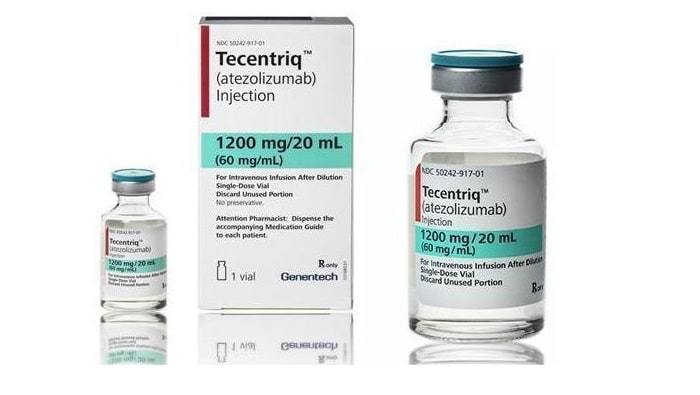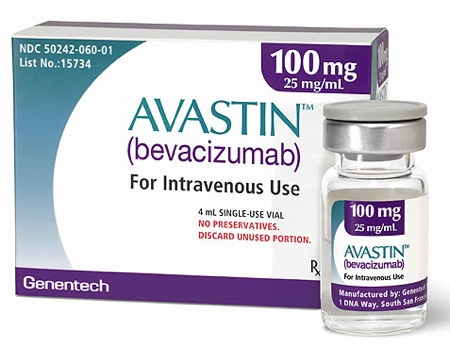Phase 3 Clinical Trial Indicates Atezolizumab Plus Bevacizumab Improves Survival In Hepatocellular Carcinoma Patients
Source: Thailand Medical News Nov 23, 2019 5 years, 5 months, 4 days, 3 hours, 51 minutes ago
Overall survival and progression-free survival in patients with unresectable
hepatocellular carcinoma (
HCC) significantly improves with a combination therapy using PD-L1 inhibitor
atezolizumab (an immunotherapy drug) and the VEGF inhibitor
bevacizumab, according to results from a phase 3 study reported at the ESMO Asia 2019 Congress.

Dr Ann-Lii Cheng, Director of the National Taiwan University Cancer Center and the study first author told
Thailand Medical News, "This is the first study in 11 years to show an improvement in survival with a new fist-line treatment option compared to sorafenib, which has been the standard of care throughout this time.
Atezolizumab plus
bevacizumab has the potential to be a practice-changing treatment option in
hepatocellular carcinoma."

Currently unresectable
HCC is a major challenge in countries with a high prevalence of this
cancer. Most patients in countries without screening programmes present with unresectable or advanced
HCC because of the late appearance of symptoms, resulting in a very high mortality rate (almost 80%).
Dr Ann-Lii Cheng added, "Despite many studies over the past 11 years, we have been unable to find any better treatment option. This has been very frustrating because sorafenib has a response rate of around 10% and is associated with severe side-effects."
The clinical study called phase 3
IMbrave150 study randomised patients with unresectable HCC to a combination of
atezolizumab plus
bevacizumab or sorafenib.
Atezolizumab reactivates the immune response to tumour cells while
bevacizumab stops tumours growing new blood vessels to obtain nutrients and oxygen but also helps upregulate host immunity to fight against cancer.
Findings showed statistically and clinically meaningful improvement in the co-primary endpoints of overall survival and progression-free survival in patients treated with
atezolizumab plus
bevacizumab compared to those treated with sorafenib.
Analyzing the findings, Dr Ian Chau, Consultant Medical Oncologist at the Royal Marsden Hospital, London, UK, said: "This is the first time a novel treatment has shown a survival benefit compared to the current standard of care. The results are very encouraging and there is a strong possibility this drug combination will be approved by regulatory authorities and be incorporated into international guidelines for advanced
HCC."
"I think this is a breakthrough and based on the results, the combination of
atezolizumab plus
bevacizumab could become the new
standard of care." said Dr Angela Lamarca, Consultant Medical Oncologist at the Christie NHS Foundation Trust, Manchester, UK.
Dr Lamarca added, "The results are clinically meaningful in the setting of advanced
HCC, as well as statistically significant. The delayed deterioration in quality of life is also important patients are living longer and their quality of life is better."
Dr Lamarca considered the study was well-designed, with several strengths including its large sample size, with just over 500 patients, the use of a combination endpoint of PFS and OS, assessment of response/progression by a central reviewer and analysis based on the intention-to-treat population.
Dr Lamarca also noted that the median follow-up of 8.6 months is relatively short, with the median OS for
atezolizumab plus
bevacizumab not yet reached. Chau agreed, noting that the improvement in OS is currently based on relatively immature data, with longer follow-up needed to confirm the magnitude of the OS benefit.
"The combination of
atezolizumab plus
bevacizumab will be very useful to patients with advanced
HCC as a new systemic therapy but, with the high cost of immunotherapy and anti-angiogenic agents, it will also be important that those drugs are accessible to patients."said Dr Ian Chau .
The clinical phase 3
IMbrave150 study randomised 501 patients with unresectable
HCC on a 2:1 basis to
atezolizumab (1200mg IV every three weeks) plus
bevacizumab (15mg/kg IV every three weeks) or sorafenib (400mg twice daily). The patients continued with their assigned treatment until unacceptable toxicity or loss of clinical benefit as judged by study investigators.
Clinical results showed the hazard ratio (HR) for overall survival (OS) was 0.58 (95% CI 0.42, 0.79, p=0.0006) after a median follow-up of 8.6 months. The median OS had not yet been reached for atezolizumab plus bevacizumab compared to 13.2 months for patients randomised to sorafenib. Median progression free survival (PFS) was also significantly increased (median 6.8 vs 4.3 months, HR 0.59, 95% CI 0.47, 0.76, p<0.0001).
On the whole, response rate was more than twice as high with atezolizumab plus bevacizumab compared to sorafenib (27% vs 12%, p<0.0001) based on independent assessment using RECIST 1.1 criteria and similarly increased using HCC mRECIST criteria (33% vs 13%, p<0.0001).
Atezolizumab plus
bevacizumab delayed deterioration in quality of life compared to sorafenib. Grade 3-4 adverse events occurred in 57% of patients treated with
Atezolizumab plus
bevacizumab and 55% of those receiving sorafenib. Grade 5 adverse events occurred in 5% and 6% of patients, respectively.
Reference : Abstract LBA3 'IMbrave150: Efficacy and safety results from a ph III study evaluating atezolizumab (atezo) + bevacizumab (bev) vs sorafenib (Sor) as first treatment (tx) for patients (pts) with unresectable hepatocellular carcinoma (HCC)' will be presented by Ann-Lii Cheng during the Presidential Symposium on Saturday, 23 November 2019, 11:00-12:30 (SGT) in Hall 406. Annals of Oncology, Volume 30, 2019 Supplement 9

